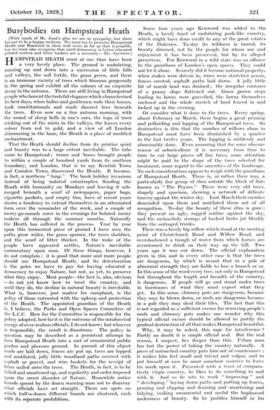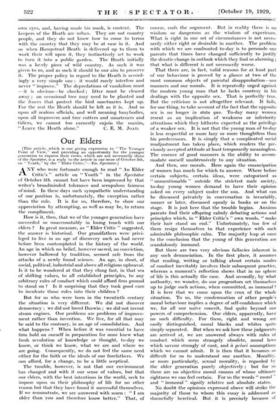Busybodies on Hampstead Heath
[With much of Mr. Joad's plea we are in sympathy, but there has got to be a 'happy medium. We must try to preserve Hampstead Heath and Kenwood in their wild state as far as that is possible, but we must also recognize that until democracy is better educated printed notices and litter baskets are a necessity.—ED. Spectator.] That the Heath should decline from its pristine quiet and beauty was to a large extent inevitable. The tube came to Hampstead ; trams and 'buses brought people to within a couple of hundred yards from its southern boundary, and London, that is to say Kentish Town and Camden Town, discovered the Heath. It became, in fact, a northern "lung." The bank holiday invasions instead of being isolated catastrophes flooding the Heath with humanity on Mondays and leaving it sub- merged beneath a scurf of newspapers, paper bags, cigarette packets, and empty tins, have of recent years shown a tendency to extend themselves in an attenuated form over the remainder of the week, and a couple of merry-go-rounds cater in the evenings for belated merry makers all through the summer 'months. Naturally the Heath has" suffered in the process. Year by year upon this tormented piece of ground I have seen the paths grow wider, the grass sparser, the trees shabbier, and the scurf of litter thicker. In the* wake of the people have appeared nettles, . Nature's inevitable commentary upon 'man. Of these things, hoWever, I do not complain ; it is good -that more and more people should use' Hampstead Heath; and its deterioration is the price we have to _pay for having educated a democracy to enjoy Nature, but not, as yet, to preserve what they enjoy.- Most people—the fact is; alas, obvious —do not yet know how to treat the country, and until they do, the decline in natural beauty is inevitable. What is, however, just matter for complaint, is the policy of those entrusted with the upkeep and protection of the Heath. The appointed guardian of the Heath is, I believe, the Parks and Open Spaces Committee of the L.C.C. How far the Committee is responsible for the policy adopted, how far it is the outcome of the misdirected energy of over-zealous officials, I do not know; but whoever is responsible, the result is disastrous. The policy in question may be described as a persistent attempt to turn Hampstead Heath into a sort of ornamental public garden and pleasure ground. In pursuit of this object roads are laid down, fences are put up, trees are lopped and mutilated, jolly little woodland paths covered with asphalt or gravel, and wire baskets for the receipt of litter nailed onto the trees. The Heath, in fact, is to be tidied and smartened up, and regularity and order imposed upon the sweet disorder of Nature. Meanwhile notice boards sprout by the dozen warning man not to disarray what officials have set straight. There are spots on which half-a-dozen different boards are clustered, each with its separate prohibition. Some four years ago Kenwood was added to the Heath, a lovely tract of undulating park-like country, which might have done credit to any of the great estates of the Dukeries. To-day its wildness is tamed, its beauty dimmed, not by the people for whose use and enjoyment it has been preserved, but by its alleged preservers. For Kenwood in a wild state was an offence to the guardians of London's open spaces. They could not let it alone. Scarcely did it become national property, when stakes were driven in, wires were stretched across, fences erected, asphalt paths laid down. A jolly little bit of marsh land was drained ; the irregular contours of a grassy slope flattened out. Grass grown steps leading to lawns were gravelled, the lawns themselves enclosed and the whole stretch of land fenced in and locked up in the evening.
Or consider what is done to the trees. Every spring, about February or March, there begins a great pruning and pollarding and lopping of the Hampstead trees. So destructive is this that the number of willows alone in Hampstead must have been diminished by a quarter in the last twelve years. The lopping is ruthlessly and abominably done. Even assuming that for some obscure reason of arboriculture it is necessary from time to time to cut large pieces off fine trees, some attention might be paid to the shape of the trees selected for treatment, some regard to the amenities of the landscape. No such considerations appear to weigh with the guardians of Hampstead Heath. There is, or rather there was, a particularly fine group of elms outside the block of flats known as " The Pryors." These were very old trees, shapely and spacious, showing a network of delicate tracery against the winter sky. Last March their enemies descended upon them and mutilated them out of all recognition. To-day the beauty of these elms is gone ; they present an ugly, ragged outline against the sky, and the melancholy stumps of hacked limbs jut bleakly from the outraged trunks. .
• There was a lovely big willow which stood at the meeting point of Christchurch Road and Willow Road, and overshadowed a trough of water from which horses are accustomed to drink on their way up the hill. Two years ago it was cut down. The official explanation given in this and in every other case is that the trees are dangerous, by which is meant that in a gale of abnormal strength they are liable to lose a branch or so. In this sense of the word every tree, not only in Hampstead but throughout the length and breadth of the country, is dangerous. If people will go and stand under trees in hurricanes of wind they must expect what they get. In this sense, chimney pots are dangerous, because they may be blown down, or roofs are dangerous because in a gale they may shed their tiles. The fact that this is not regarded as a sufficient excuse for removing people's roofs and chimney pots makes one wonder why this typical official excuse should be allowed to justify the gradual destruction of all that makes Hampstead beautiful.
Why, it may be asked, this rage for interference ? Partly no doubt it is simple official zeal. But the real reason, I suspect, lies deeper than this. Urban man has lost the power of taking the country naturally. A piece of untouched country puts him out of countenance ; it makes him feel small and trivial and vulgar, and to put himself at ease he must somehow contrive to leave his mark upon it. Presented with a tract of compara- tively virgin country, he likes to do something to and with it. And so he sets to work " improving " and " developing," laying down paths and putting up fences, pruning and clipping and draining and smartening and tidying, making ornamental and useful the haphazard uselessness of beauty. So he justifies himself in his own eyes, and, having made his mark, is content. The keepers of the Heath are urban. They are not country people, and they do not know how to come to terms with the country that they may be at ease in it. And so when Hampstead Heath is delivered up to them to work their will upon it, they instinctively set to work to turn it into a public garden. The Heath initially was a lovely piece of wild country. As such it was given to us, and as such it should be our aim to preserve it. The proper policy in regard to the Heath is accord- ingly a very simple one : it would rarely interfere and never " improve." The depredations of vandalism must —it is obvious—be checked ; litter must be cleared away ; an occasional tree may need to be planted and the fences that protect the bird sanctuaries kept up. For the rest the Heath should be left as it is. And so upon all zealous officials, and well meaning busybodies, upon all improvers and tree cutters and smarteners and tidiers, we cannot too earnestly enjoin the maxim,























































 Previous page
Previous page